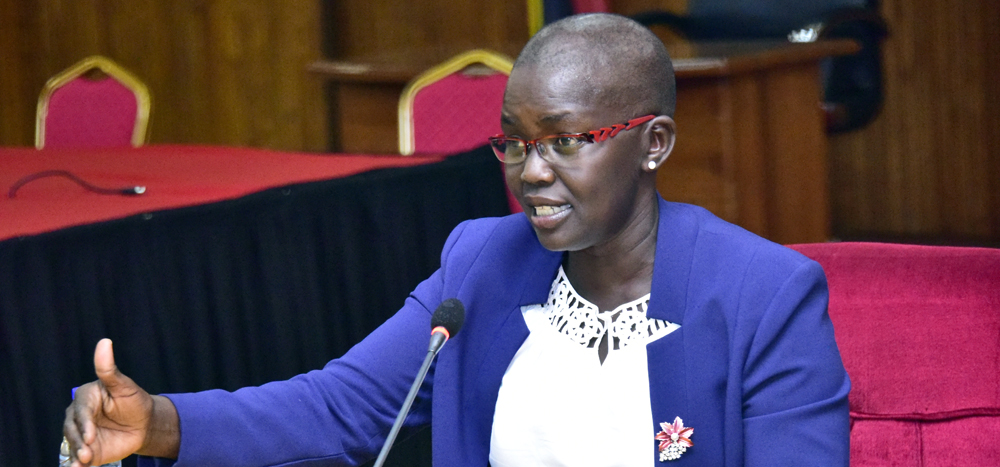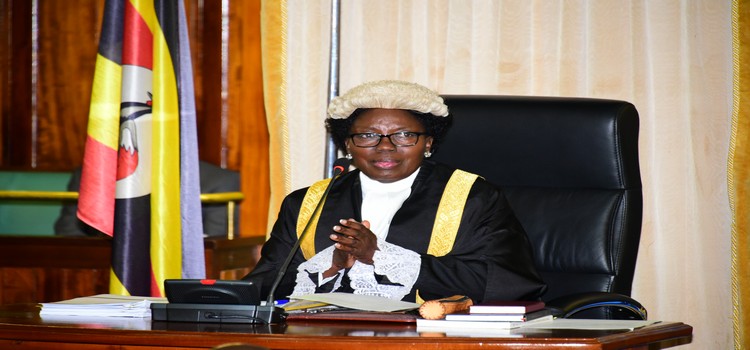The Director of Public Prosecution, Jane Frances Abodo (pictured), has requested Parliament to amend section 21(1)(q) of the Income Tax Act to exempt State Prosecutors from paying tax on their employment income, so as to motivate her force.
Abodo made the appeal while appearing before Parliament’s Finance Committee where she decried the selective enhancement of salaries within the Justice, Law and Order sector that saw judicial officers walk away with hefty pay, while casting other players in the industry aside.
While defending the request of the tax exemption, Abodo argued that the work of public prosecutors directly contributes to the peace and security of the country by ensuring that the laws designed for the protection and preservation of the security of the persons and property are enforced.
“Without peace and justice, the economic growth and prosperity of our people can never be realized. Because I don’t think there is any investor where there is lawlessness and criminality isn’t punished and criminals are roaming the streets,” she said.
The DPP informed Parliament that the Prosecutors are the only actors in criminal justice cluster whose employment income is still being taxed and yet the Prosecutors have the same academic qualifications as their counterparts in the Judiciary, work in the same environment, carry a similar workload and called on the Committee to correct this anomaly by way of amendment of the law because it is only fair that their salaries are equally exempted from tax just like their counterparts.
She revealed that due to the meager pay at the DPP has seen many staff abandon work in preference for lucrative deals in the Judiciary, admitting that she has also applied thrice at the Judicial Service Commission to be posted as a judge, and her actions aren’t any similar from her team who approach her daily to sign recommendation letters for secondment of jobs in the Judiciary.
“The rate of staff turnover at the DPP is high. Every single year, the office loses a big number of staff to other institutions especially the Judiciary because of the tax incentive. The staff we lose to the Judiciary, private practices and other agencies with better emoluments leave with very high skills accumulated over time that cannot easily be replaced hence leaving the DPP in a state of stagnation over time,” added Abodo.
The DPP informed the Committee that although the President directed the Ministry of Finance to enhance salaries of state prosecutors, this directive hasn’t been honoured which prompted the team to seek for tax exemption, a move she said would likely cost Government Shs6.827Bn, although this figure is disputed, by Ministry of Finance that warned that the tax waiver is likely to cost Shs7.5Bn going by the current wages and staff at the Office of Directorate of Public Prosecution.
Herbert Tayebwa (Kashongi County) backed the request saying it will boost the morale of state prosecutors while carrying out their duties remarking, “They have a case, they need tax exemption first of all not for financial benefit but motivation. Because like they stated, they have the same qualifications like officers in the Judiciary, now if you treat them separately, it de-motivates them.”
However, Xavier Kyooma (Ibanda North) expressed reservations on the request for tax exemption wondering why the state prosecutors who made two requests of salary enhancement and tax exemptions don’t settle for one of the two items.
“To me it is a contradiction, you should have gone for one of the two. Because once your salary is enhanced, it can be enhanced in such a manner that even when your Pay as You Earn is deducted, your welfare is not affected. But in the circumstance that you have asked for salary enhancement and tax exemption while aware that it is through these taxes that your salaries are paid, it is a contradiction, explained Kyooma.
Documents tabled before the Committee include a letter by President Museveni authored on 15th August 2022 where he wrote to the Ministry of Finance authorizing for the tax exemption on salaries of DPP arguing, “I agreed to the request because of the nature of their work is risky and greatly contributes to the stability of the country.”
However, it wasn’t until 6th January 2023 that Minister of Finance, Matia Kasaija replied to the President’s letter, protesting the proposal to exempt income of state prosecutors form tax, and instead proposed to have the salary enhancement approved.
Minister Kasaija wrote, “Government has already granted many tax exemptions in the various tax laws and there is no fiscal space to grant further exemptions because exemptions lead to loss of revenue to Government. Our analysis show that exempting the income of state prosecutors alone would lead to an additional loss of revenue amounting to Shs7.5Bn annually at the current wage and the number of employees.”
Kasaija defended his decision arguing that tax exemptions grossly undermine Government revenue efforts, quoting a report from the Ministry of Finance which put the 2021/2022 revenue foregone on account of tax expenditure amounted to a tune of Shs2.862Trn, saying there is therefore no need of granting income tax exemption to select categories of employees in this case state prosecutors.
However, Kasaija’s letter was rejected by Enos Asiimwe (Kabula County) who argued that the Finance Committee has been grappling with the issue of tax exemption and trying to find ways to enhance revenue collections, prompting the Committee to issue a blanket ban on approval of tax exemptions.
He said, “The unfortunate bit is that yes your money is very small, Shs6.8Bn which they should have given to you. But the problem is that the Ministry of Finance will deny you the exemption, and give it to someone else in billions. That is why we are passing a blanket opinion that we shouldn’t issue any more exemptions.”





